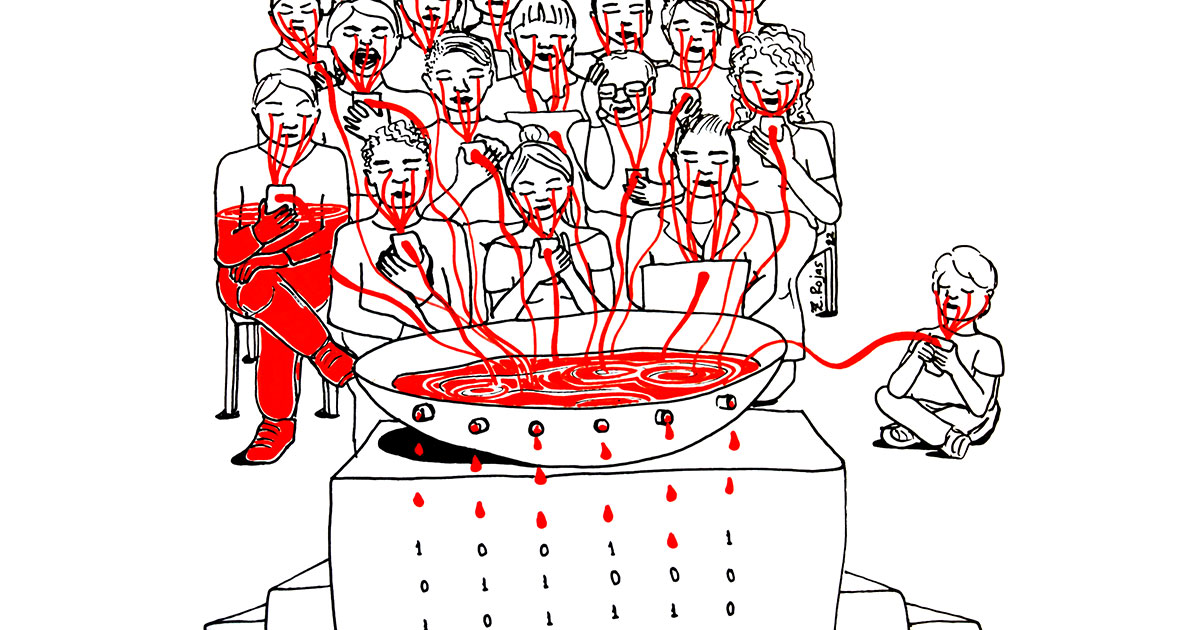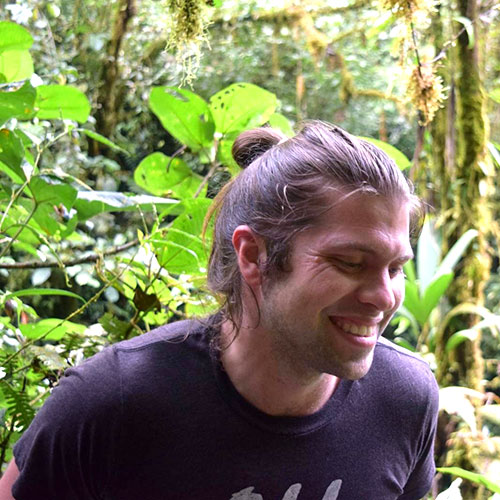LET’S DO LUDDISM
★ ★ ★ ★
OUR FARM

Art by Andrea Zambrano Rojas
By Cory Massaro
Consumer software is factory farming us. It makes a weeping udder of our attention, and fetid stalls of our living rooms; it gathers data about us like fleece or milk or eggs.
At various points in my life, I’ve found myself working for FAANG companies (Facebook, Apple, Amazon, Netflix, Google) as a software engineer. Like any office job, those gigs were corporate, mind-numbing, and dehumanizing. There were interminable meetings and compulsory social hours. There were surreal pep rallies where dozens of tired working bodies would be crammed into featureless angular rooms; and the bodies would be made to sit facing the same direction while some director or vice president pontificated; and sometimes the important man-up-front would careen around the room with stimulant-wide spiderweb eyes, and sometimes they would stare into the middle distance while clicking through slideshows.
In most places, such rallies are dull but innocuous. The bodies listen to the man and then go about their day. Yet at highly visible tech companies, the fantastic overstatements constitute actionable threats. One vice president, I recall, delivered a harangue about making “our” product “addictive.” He was the careening, gesticulating, wide-eyed type. “We have to train the user,” he bellowed, “until they need to use our product.” The speech was overwrought and silly; then the product went public, and it became retroactively sinister.
It’s known (even the most pro-corporate, neoliberal media outlets admit it) that tech companies avail themselves of psychological and neurological research to create addiction loops. Wielding bright colors, cute animal pictures, and stimulus-response delays as bludgeons, they hammer open vulnerable chinks in our behavioral armor. Once hooked, we don’t just seek more of the same stimulus: our behavior qualitatively shifts, its unique or anomalous edges getting worn down until we learn to follow the same well-worn paths, through the same on-screen icons and menus, to a hoped-for and calculatedly uneven reward. This makes our behavior easier to predict, and our data thus easier to harvest.
If you want proof of this intent, check out Nir Eyal’s “Hooked: How to Build Habit-Forming Products.” Without a hint of irony, Eyal accesses the psychological language of addiction in order to promote and valorize (not criticize) a model for “hooking” “users.”
In short, we have become eminently farmable.
* * *
Corporations provide free software to us like farmers offer free milking clamps to cows. What we believe to be true, well-founded or no; what we desire; what we consider correct and moral—all this data is harvestable. And we, like hyper-bred chickens, are made to overproduce. We join Facebook groups; we follow personages on Twitter (some sincerely, some ironically); we form unwavering opinions about celebrities’ misdeeds. This tremendous undertaking, to believe and signal our belief, is siphoned off into sloshing pails of big data. Politicians, retailers, search engines (supported by advertising revenue), and a legion of other entities use that data to decide what we should see. If the belief they extract from us evinces an interest in centrist politics, or tailor-made suits, or books about psychology, we’ll later see content on our screens which further entrenches those desires and beliefs. The resulting feedback loop has variously been called a “filter bubble” or “echo chamber.”
In this way, our eyes are kept on the screen. We are trained to produce more formulaic data, and to produce more of it.
We see more of what we like; we keep looking; they keep squeezing.
* * *
I once worked at a “software education” company. The idea was to pay students a small stipend to work on open-source software (usually a volunteer effort) under the guidance/mentorship of a more experienced programmer (me, in this case). The students and I believed this was a good thing: they were getting paid to do notionally high-minded work that would later help them get jobs.
After six months, the place had turned into a sweatshop. The “open-source” software now consisted overwhelmingly of projects led by Facebook or Google. Other students had been duped into working with the Department of Defense. They were making less than minimum wage.
It reminded me of Napoleon Hill, a twentieth-century conman and “intellectual” grandfather to both The Secret and Donald Trump. His most interesting scam, the Automobile College of Washington, promised to teach students how to manufacture automobiles over the course of six weeks, after which graduates were given to expect earnings of up to $200 per week (roughly $5000 today). Yet instead of offering instruction, Hill shunted his students off to a local factory, where they worked without pay. Hill received kickbacks from the factory—in addition to the tuition his students paid him. The automobile was to the twentieth century as the software industry is to the twenty-first: it was the hot tech, the path to riches, a gold rush. And where there is a gold rush, there will always be charlatans around to scalp shovels and peddle dowsing rods.
In a broader sense, all start-ups operate by preying on workers’ beliefs. Employees receive a miserable salary and generous stock options. Employers wring more work out of workers who believe–believe that this start-up is going to be successful (unlike a hundred others), that these stock options will be worth money one day (against all odds).
Exploitation of worker belief is the other side of the attention economy. On the consumer side, “users” are farmed for screen time; on the production side, chattelized workers are farmed for keyboard time.
* * *
I haven’t talked here about the dangers of misinformation or how social media accelerates political polarization. These are also afflictions of belief, and also largely the fault of consumer technology, and also deserving of discussion.
Yet my present gripe is more basic. I don’t want to be farmed. I want to believe what it is true and good to believe, not what makes somebody money. If I must produce, I want to produce that which sustains and satisfies my neighbors, not what pleases my oppressors. But behind my screen, isolated as though in a stall, transfixed as though caught in a milking clamp, I can’t help but be farmed.
* * *
The Luddite Bestiary
The Cardinal Turtle
When the Earth’s magnetic poles reverse, it is not the work of an instant. The poles clamber around the planet’s face at the rate of a few dozen kilometers a year. In that era, compasses cease to work; the planet lacks its protective magnetic field, and solar winds skin all biomes alive.
The next time this happens, you may avoid becoming lost in the following way. There is a certain turtle who feels the Earth’s rotation, for he moves slowly. You will find him trundling north or south, at the pace of a few dozen kilometers a year. His carapace is an immense lodestone. He will leave a trench in the ground as he goes, for he is heavy; and he will clatter his beak, for he is hungry. And for a thousand meters around him, the solar winds will be repelled by the lodestone; and likewise within the trench, there is safety, for he magnetizes the telluric iron as he gouges the earth.
The trench he leaves behind him, you should fill with water. You should bring fish from nearby lakes and streams, and place algae and insects there for the fish to eat. Retrieve one of the fish each day, and bring it to the turtle for his food, and his feces will fecundate the stream that he is digging.
Now, if you become lost, you have only to follow the stream. It will always point the way to the cardinal turtle.

Cory Massaro is a native of Ohio, U.S.A., now at home in Quito, Ecuador. He spends his time learning languages, writing, playing music, coding, and propagandizing. He actively opposes materialism, consumption-as-cultural mandate, and all forms of hegemony. He is in favor of small, robust communities and gently destroying hierarchies wherever he goes. His fiction and poetry draw on the grievances he has stored in his heart since working in technology; his dearest hope is to predict accurately how egalitarian, worker-centered societies will revive the oral tradition to weather the climate wars.
See more work by artist Andrea Zambrano Rojas here.
























0 Comments